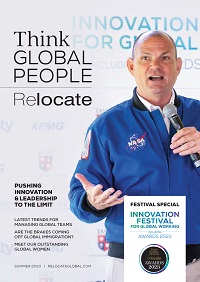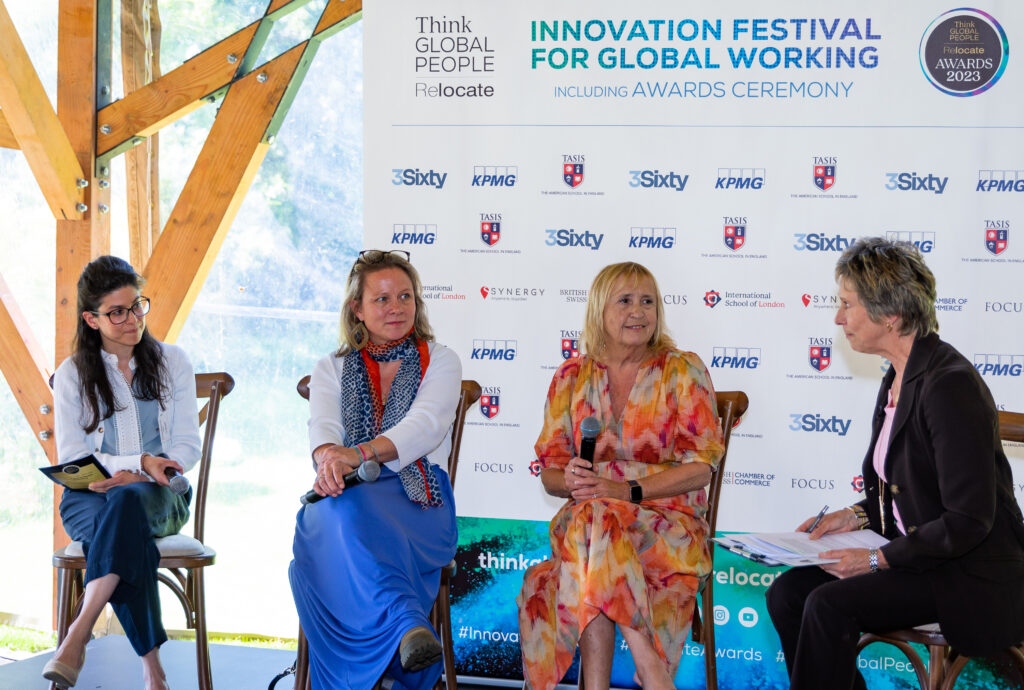The drive for companies to become more entrepreneurially focussed in the new world of work
Our experts examine how an entrepreneurial mindset is essential to survive in the current economic climate, how today’s school leavers will shape future strategy and engagement, and why in many countries the concept of returning to the office full time is effectively finished
Embracing change, listening to your staff and taking a more entrepreneurial approach to business are approaches which are already paying dividends for progressive companies.
The leaders of globally mobile workforces in 2023 face a variety of conflicting challenges. They need to recruit and retain talent against huge competition on a global stage. They need to be mindful of their Environmental, Social and Governance (ESG) policies and Diversity, Equity &Inclusion (DE&I) policies, both to satisfy customers and to ensure they recruit and use all of their talent in their organisations. Yet they also face increasing demands from staff for flexible working while having to grapple with a backlog in visa and work permit from governments around the world. In many countries, tax and benefit systems have also become more tightly regulated, which brings with it the risk of financial and reputational damage.
At the Innovation Festival For Global Working we will be bringing together a panel of experts to discuss these thorny issues and also explore the huge opportunities that exist. Our experts will discuss the challenges of learning to manage five generations of employees within one organisation, and how to harness innovations that are helping organisations and international managers respond to change.
This article is taken from the latest issue of Think Global People magazine. Click on the cover to access the digital edition.
Watch the video highlights from the Innovation Festival for Global Working
A fresh perspective on education, innovation and leadership
In our afternoon keynote panel, BAFTA-nominated TV presenter Jayne Constantinis will interview panel speakers Ann Ellis, CEO, Mauve Group; Valerie Besanceney, International education and transitions consultant, author, Executive Director, SPAN; and Demetra Marcantonio, Director, KPMG Global Mobility Services team London, to capture how the world of work has moved on from 2022.
These three experts have unique perspectives how Covid has changed the world and what we can expect from forward-looking company policy and the expectations of the workforce. We caught up with them in advance of the afternoon session to get a taste of what is in store.
Wellbeing and identity are top of the agenda in International Schools as well as the workplace
The COVID-19 pandemic brought about a greater awareness of the importance of nurturing staff mental health and wellbeing. This has now been extended to thinking about the experiences of young people post-pandemic as they move around the globe with their families. There is now a fresh perspective on school transitions and their challenges, and how the children of globally mobile families need to develop extra strategies and skills to cope.
Valerie Besanceney says international schools have been seeing a higher demand for professional development in addressing transitions and are now emphasising general well-being and mental health in addition to academic continuity.
“While international schools aim to equip students with skills for global citizenship and cross-cultural understanding, many of these young people also need guidance in understanding their own identity and journey as an international student in order to build confidence,” she says. As a result, schools are engaging in conversations and providing support to help students navigate their transitions effectively.
“As an organisation we have long talked about the challenges that come with mobility for students. How it affects their learning, and how we can how we can ensure that they can really reap the benefits of a global mobile lifestyle, but also have an international education and provide them with life skills that they can use to adapt throughout any transition,” she explains.
“One of the things that did grow out of the pandemic is a more honest and thoughtful conversation about how these transitions affect children. Previously, schools and the parents were more focused on what the academic transitions would be for a child and how they could best support them through that,” she says.
“Now they are also seeing that if the emotional wellbeing of the child isn’t addressed first, then there’s no point in addressing all the other academic elements. We have a duty of care to support our students’ and our children’s mental health and equip them with the strategies and skills that they will need now and later in life.”
The demands and expectations of the younger generation in the workforce are also very different from before, and as these global children leave school, they will have a novel approach to their work and their career.
How can companies attract school leavers and satisfy the new generation?
Indeed, these digital natives have many of the technology-savvy skills that employers are looking for. However, in order to attract them, many organisations will need to rethink the employment proposition that they are currently offering.
Companies will need to respond to this new demand with a flexible, open workplace that offers real inclusion and a genuine work-life balance.
“For the younger generations, there is less focus on the traditional vertical career ladder and more emphasis on having these different experiences, moving around, and enjoying different roles and challenges,” says Demetra Marcantonio.
“As a result of the war for talent, we are seeing organisations look more closely at their internal talent and the internal workforce and start to get better at matching the demand and supply of skill.”
The young people of today have high expectations and expect a great deal of flexibility from their employer, says Ann Ellis.
“I can’t see companies making employees return to the office full time,” she says. “The work life balance is so much more important than it was to previous generations. Young people want to feel that they can enjoy their lives as well as do their work. They want to work fewer hours and move around to make the most of opportunities.
“They are tech savvy and they are very conscious of wanting to work for a company that matches their values. They are looking for an employer who can demonstrate equality, inclusion and diversity, and as a result of the global skills shortage, they do have the upper hand and they will be the ones that really tell us what the future will be.”
Demetra says the young people of today are expecting have high expectations and expect a great deal of flexibility.
“The work-life balance is so much more important than it was to previous generations,” she says.
Valerie points to the ongoing efforts by international and national schools to introduce policies and conversations around diversity, inclusion, and equity, and the role of schools in equipping students to continue these conversations and practices as they enter the workforce.
“Conversations are crucial to everything that is related to transitions and helping students understand their identity better,” she says. “Many of these children will not have one single answer for the question, where do you belong, but they will need to feel like they are in an environment where they do feel safe and heard.”
What are the new demands of the global workforce currently?
Ann Ellis says there are also changing expectations regarding work location and flexibility across existing staff, and companies face challenges in hiring talent due to employees’ preferences for remote work and work-life balance.
She cites the increased importance of benefit packages in attracting and retaining employees, with higher expectations for health insurance and pension plans.
“From my point of view, the changes observed from 2020 include a greater emphasis on remote work and flexible arrangements, as well as an increased awareness of work-life balance and employee well-being,” she says.
“Companies are facing challenges in adapting to these changes and attracting the right talent. The pandemic has accelerated these shifts in work preferences and has made it more crucial for businesses to provide competitive benefit packages.”
Staff are asking to work wherever they feel comfortable, and this has brought a lot of demands on the companies that need their talent and want to recruit or retain them.
“For example, we are being contacted by UK companies to employ people who are located in other countries in Europe because those people don’t want to move to the UK,” she says.
“The Brexit situation hasn’t helped because of the need to have permits to work compliantly in the UK. On top of that, people are more choosy about the type of job they want. They want more freedom in their work, they want to work less hours. This is where are lots of challenges now for businesses to attract and retain the right type of people in their companies.”
Organisations are also having to think more entrepreneurially and need to take risks in order to move with the market.
“A lot of our work is involved in providing risk assessments,” Ann explains. “I am an entrepreneur at heart and that, to me, the most important thing has always been to look forward to the next challenge and always be ready for changes. And I think that’s something that companies need to have to be more even more aware than ever. If they don’t look forward and are not ready to embrace change, then they’re left behind.”
She explains how Mauve has had to move with the times, setting up new satellite offices and looking for multilingual talented staff who can support the new growth and expansion that the company is currently enjoying.
“We started off supporting telecoms companies, and we now work with a lot of NGOs. They are always looking for solutions, for example in Africa and Central America. We follow the demands of our clients and at the moment we are concentrating on building teams in Latin America and in Asia. We feel those regions at the moment are still growing. We have a base in the United States and we are going to register a hub in Miami, because we see that as a good base for North and South America. It also gives us a good source of talented, Spanish-speaking people who can join our team.”
As a result of Mauve’s flexibility, adaptability, and global perspective in meeting the needs of clients, Ann and her team are able to leverage opportunities in new and emerging parts of the world – all while looking at challenges through an entrepreneurial lens.
AI and technology are changing the way we work – but human contact will always be paramount
There has been much debate about the benefits and risks of Artificial Intelligence and how it will change the way we work and mean the ends of some more traditional jobs which can down be done by machines rather than humans.
Valerie says AI will have a profound impact on society, and on the jobs and careers of today’s students and school leavers.
“We have had many conversations with educators, stakeholders and international schools from all different angles on how AI is already impacting and will continue to impact the educational environment,” she explains.
“Even though AI can offer so many translations, it lacks the personal connection and the nuances that humans have and that they understand once they know the culture and language of another country.”
One arena in which international schools may have an advantage over state or country schools is the importance of STEM subjects within the international schools curriculum. Qualifications such as the International Baccalaureate (IB) potentially provide a more rounded education because young people are not forced to give up so much subjects early on and can continue to develop learning in STEM subjects post-16.
“We are working with a generation in schools who are better equipped to define what their purpose is and what their career goals are,” says Valerie.
“This is where alumni are really important in international schools. We are seeing students creating their own personal definition of success, which is certainly not the same as the past few generations. The international schools are getting better at having those conversations. It is not that the younger generation want to work less efficiently, they just want a better balance of life and work, and technology can help them.”
See the programme for The Innovation Festival for Global Working here

Join Think Global People
Our exclusive membership network for decision-makers, aspiring leaders, experts and thought leaders focused on global business and working.






